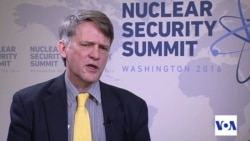VOA State Department Correspondent Pam Dockins interviewed Ambassador Bonnie Jenkins, coordinator for Threat Reduction Programs, at the Nuclear Security Summit in Washington on Friday.
Question: Looking ahead, at the take-aways from summit ... what is going to be the U.S. catalyst going forward to help these countries meet some of their nuclear security goals?
Bonnie Jenkins: One of things we did was working closely with countries to try and get them to move into areas of nuclear security. One of the things the summit has done has provided a catalyst for countries to move forward in terms of things needed to be done. ... Now summit ending in current format … other countries may want to do a summit, or the next president may want to do a summit, still use existing bilateral channels, working directly with countries, working with U.N., other international organizations, initiatives. … Even though (it's) over now, still feel other ways we can work with this country, including Russia, who is not here.
Q: This is broader question, looking at possible nuclear terrorism as part of broader concern. … When groups such as Islamic State ... carry out attacks in the Middle East … what particular challenges does this present to the U.S. in effort to counter nuclear terrorism?
Jenkins: Realize that we have to work very hard, and the work we have been doing … in terms of securing material, securing bio pathogens, securing precursors ... that we have to be even more diligent. … Certain groups out there who want to do harm, if get hands on weapons, materials, they would use them. … Think if nothing else, makes us realize how important situation is. … Nuclear terrorism is certainly an issue, need to concern ourselves with biological, chemical, and keeping it out of the hands of those who want to do harm.
Q: When you look at certain countries, regions, where are the weak links?
Jenkins: Prefer not to say weak link, don’t want to indicate that there’s … weak links. ... Prefer to ... look at all countries as strength in all countries. Certainly some will need more work than others, but overall think important thing is make sure all countries have strength in physical protection, strength to stop trafficking, able to work with other countries, work through IAEA to get work done.
Q: Overall, when looking at these types of threats, does U.S., at this point, think greatest threats are emanating from state actors or non-state actors?
Jenkins: Interesting question. … In 1990s, work was on states ... treaties, conventions. … While still issue for a few countries, are a lot more focused on non-state actors, particularly after 9/11. … Think lot of the work you are seeing now, in the Nuclear Security Summit, work I do … in my portfolio at DOS (the U.S. Department of State), which is focused on prevent weapons of mass destruction terrorism … lot more focus on non-state actors because it’s such a difficult threat. Have to follow people, money … what can take on plane … lot more of a challenge. Type of activities have ... gone from traditional deterrence to non-state actor focus.
Q: Going forward the 50 or so countries represented here today, what’s the accountability factor for these countries? ... Goals will be reached, broad plans laid out, but what’s the accountability factor to ensure countries follow through?
Jenkins: Since we don’t know of future summits, discussion about whether there’s a way people could meet in the future … to do the very thing you are talking about, look at how commitments being implemented … action plans being implemented, how are the gift baskets that countries are agreeing to do specific activities are being implemented … see what role the IAEA can play. ...
Q: Anything you would like to add?
Jenkins: I’ve been doing this since 2009, and it’s been great to see how much international community has accomplished. ... Started out with, I think, 48 (countries) when South Korea hosted in 2012, added a few more countries, added Interpol, so have three international organizations, and then stayed the same. ...





